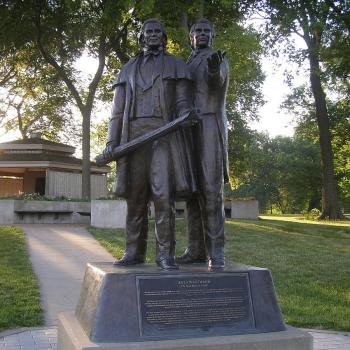Editors' Note: This article is part of the Patheos Public Square on Faith and the Election. Read other perspectives here.
"Religion and politics shouldn't mix."
One hears this statement often. It makes for a nice bumper sticker, but as a serious analysis of the relationship between faith and the political process it leaves a lot to be desired.
When people say this, they really mean something like, "People should not use their religious beliefs to justify policies I don't like." Yet in a democratic republic that guarantees civil liberties, some connection between religion and politics is inevitable. Few progressives today would argue that anchoring the civil rights movement in churches somehow made it illegitimate. Likewise, many LGBT-affirming churches were welcomed into the struggle for marriage equality as a necessary and vital counterpoint to the exclusionary rhetoric of the Religious Right.
The problem isn't faith and politics interacting, it's how they relate to one another. That relationship need not be a problem if some simple ground rules are kept in mind. To wit:
Every religious and secular group has the right to speak out, but none has the right to be obeyed. The United States is a secular republic, not a theocracy. If you want me to live under your religion's rules, you'd better have a good reason. "Because my religion is true" and "Because we're the majority" aren't good ones. A religion that wishes people to adopt its moral codes would do better to rely on persuasion, not the power of government, to make its case.
Every group — religious and secular — is free to put its agenda before the public, but it should expect spirited debate and pushback. Religious opinions are not beyond the reach of criticism simply because they are religious. Houses of worship and religious organizations have every right to enter the public square and contend for their views. But some of what they want to do is controversial, and other groups will strongly oppose their agendas. That is how the political process works. It's a rough-and-tumble world; if you're not ready for that, stay out. Also, spirited (and even aggressive) opposition to a religious group's agenda should not be confused with an effort to prevent that group from speaking out. Religious groups have the right to speak and contend for specific policies. They don't have a right to have no one work against them.
Our laws must have a secular basis. The Constitution makes it clear that the United States is not a religious state. Therefore, laws cannot be overtly anchored in theology. Religious groups should be prepared to articulate secular rationales for the legislative proposals that they support and promote. Government is not a theological referee and can't be in the business of enforcing any group's dogma. A religious motivation, however, doesn't automatically invalidate a law. Many of the people who pushed to end racial discrimination were motivated by their faith. That's not a problem because there were many secular reasons why such discrimination had to end.
The Constitution has limits. Some conservative religious groups pursue an agenda that cannot be implemented under our current Constitution. They seek preferential status for their set of beliefs and want the government to impose those beliefs on all its citizens. This would result in a host of problems, not the least of which could be discrimination against nonbelievers, LGBT individuals, and women. This can't happen, short of rewriting the Constitution. A politically mature movement understands what's possible and what's not.
One person's obvious religious truth is another's utter nonsense. The United States is a pluralistic, multi-faith, multi-philosophy society. People hold many different views about theology. That's one reason we don't base our laws on religion — people simply don't agree with each other. A core value of the separation of church and state is that while all people are free to express their views, no one will be compelled to subsidize or support someone else's religion or live under its theological mandates.
Federal laws restrict partisan politicking by non-profit entities. Tax exemption is a benefit that comes with conditions. One of them is that organizations — religious and secular — that hold this status may not engage in partisan politicking by endorsing or opposing candidates for public office. Issue advocacy is permitted, but candidate advocacy/opposition is not. Groups that don't want to abide by these rules are free to give up or not accept tax-exempt status.




